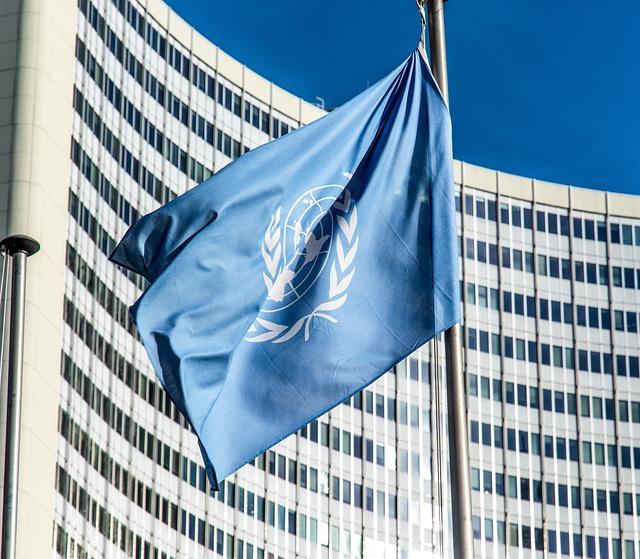In a notable escalation of tensions between the Serbian government and civil society, police conducted a series of raids on various non-governmental organizations (NGOs) linked to USAID funding. The operation,which unfolded in multiple locations across the country,has raised alarms among activists and international observers who view it as an attempt to stifle dissent and limit the influence of foreign funding in Serbia’s political landscape. With the government’s ongoing scrutiny of civil society organizations, this incident underscores the broader challenges facing NGOs amid a shrinking space for civic engagement. As stakeholders react to the raids, questions remain about the implications for democracy and human rights in Serbia, as well as the future of international support for local initiatives.
Police Action in Serbia Targets Civil Society Groups Fueled by USAID Support
In a surprising move that has raised alarms among advocates for democracy and civil liberties, Serbian police launched a series of raids targeting non-governmental organizations (NGOs) allegedly linked to funding from the United States Agency for International Development (USAID). These operations are part of a broader crackdown seemingly aimed at stifling dissent and curtailing the influence of civil society in the Balkan nation. Critics argue that the government is mischaracterizing these organizations, undermining their essential role in promoting clarity, human rights, and democratic governance.
supporters of the affected civil society groups point to several key factors underpinning the ongoing tensions:
- Perceived Threat to Authority: The Serbian government views the activism funded by foreign aid as a challenge to its legitimacy.
- Potential Misinformation: Authorities claim that these organizations are spreading propaganda, while many argue that they are simply advocating for accountability.
- Global Concerns: International observers warn that governmental pressure on NGOs reflects a troubling trend of authoritarianism sweeping through parts of Europe.

Implications for Democracy and Civil Liberties in Serbia
The recent police raids on civil society organizations receiving funding from USAID have raised significant concerns regarding the erosion of democratic principles and civil liberties in Serbia. This aggressive action not only targets specific groups but also sends a chilling message to the broader civil society sector. The implications are multifaceted: it undermines the right to free association, stifles dissent, and creates an environment of fear where non-governmental organizations may hesitate to operate or advocate for critical social issues. In a country where civil discourse is vital for democracy, such heavy-handed measures threaten the very fabric of civic engagement.
Furthermore, the crackdown reflects a troubling trend in which government entities seek to control narratives and restrict access to funding for organizations that challenge prevailing policies. As citizens witness their representatives increasingly delegitimize essential community voices, there is a risk of further polarization within society. Key implications include:
- Reduced Civic Participation: citizens may withdraw from participatory politics due to fear of reprisal or government scrutiny.
- Limitation of Free Speech: Organizations’ ability to criticize government actions is jeopardized.
- Weakening of Checks and Balances: The independence of civil society organizations is crucial for holding government power accountable.
This climate of repression not only constitutes a direct threat to democracy but also sets a precedent for future governance in Serbia. Without the active participation of civil society, the democratic process risks becoming unbalanced, sidelining essential voices in policy-making and community engagement.

Understanding the Role of Foreign Funding in Local Activism
The recent police raids on civil society groups in Serbia, notably targeting organizations receiving funding from USAID, have sparked intense debate about the implications of foreign funding in local activism. Foreign financial support has long been both a lifeline and a contentious issue for non-governmental organizations (ngos) across the globe. On one hand, it enables these groups to foster democratic values, advocate for human rights, and implement social programs.On the other hand, it raises suspicions among governments that view such funding as interference in their domestic affairs, leading to a cycle of crackdown on NGOs under the guise of national sovereignty.
Understanding the intricacies of foreign funding involves examining various factors such as accountability, transparency, and the nativism of activism. Activists argue that financial support from foreign entities can enhance their effectiveness and reach, particularly in environments where civic space is shrinking. However, it is crucial to address how this funding affects the public perception of these organizations. Key points include:
- Perception of legitimacy: Foreign funding can lead to skepticism about an NGO’s alignment with local priorities.
- Operational dependency: Overreliance on international donors may compromise an organization’s independence and priorities.
- Cultural relevance: Foreign-backed initiatives must resonate with local communities to ensure impactful advocacy.
In light of the raids, a closer examination of the funding structure, along with increased transparency, could help bridge the gaps of mistrust. Moving forward, creating a robust dialog between civil society and government agencies is paramount to harmonizing foreign support with local needs, ensuring that the essence of activism remains genuinely grassroots-oriented.

Government Response and its Impact on International Relations
The recent police raid on civil society groups in Serbia, particularly those receiving funding from USAID, marks a significant escalation in the government’s efforts to regulate non-governmental organizations. This action has drawn widespread condemnation from international observers and raised concerns about the implications for democratic governance in the region. Critics argue that such measures could lead to the stifling of dissent and undermine the crucial role civil society plays in advocating for transparency and accountability. As Serbia’s relationship with the West,notably the United States,comes under scrutiny,the potential for diminishing diplomatic ties increases,affecting cooperation on various fronts,including security and economic development.
In the broader context of international relations, this crackdown may signal a shift towards more authoritarian governance in Serbia, which could complicate the country‚Äôs aspirations for European Union membership. Observers note that while Serbia has professed a commitment to EU integration, the treatment of civil society organizations raises red flags about its adherence to the essential principles of democracy and human rights. The international community faces a pivotal moment in determining how to respond effectively to these developments, with potential strategies including diplomatic pressure, targeted sanctions, or strengthening support for local advocacy organizations. The outcomes of these interactions will likely shape Serbia’s geopolitical landscape in the coming years.

Recommendations for Protecting Civil Society Amidst Repressive Measures
Considering recent crackdowns on civil society organizations, it is crucial for stakeholders, including governments, NGOs, and international bodies, to adopt proactive strategies aimed at safeguarding these essential entities. First, fostering an ecosystem of transparency and accountability is key. Policymakers should create clear regulations that protect civil society operations and funding sources, ensuring that organizations can function without fear of repression. second, establishing strong networks among civil society groups can provide mutual support and amplify their voices against authoritarian measures. By sharing best practices and resources, organizations can strengthen their resilience and advocacy efforts.
Moreover, engaging the public through education and awareness campaigns about the value of civil society can mobilize grassroots support. Community involvement plays a pivotal role in counteracting oppressive governance. Strategies may include holding town hall meetings, utilizing social media platforms, and collaborating with local media to disseminate narratives that highlight the contributions of civil society. Lastly, international solidarity is imperative; global partnerships can offer not only resources but also a robust support system to deter oppressive actions. This multifaceted approach is integral to preserving the democratic fabric of society.

The Future of USAID Funding and Its Effectiveness in Serbia
The recent police raids on civil society organizations in Serbia, linked to USAID funding, have raised critical questions about the future of international aid and its overall effectiveness. Civil society groups have historically played a pivotal role in fostering democratic processes and promoting human rights in Serbia. The scrutiny surrounding USAID funding brings potential implications for both the stability of these organizations and the broader implications for US assistance programs. This incident underscores a concerning environment where support from international partners may be seen under a lens of suspicion, possibly stifling the essential contributions of civil society to national discourse and governance.
As USAID reevaluates its funding strategies in light of these developments, a focus on transparency and collaboration with local stakeholders will be imperative. The challenges of operating in a tense political landscape may require USAID and similar organizations to innovate in their approaches. Key aspects to consider include:
- Increased Engagement: Building stronger partnerships with local groups to enhance trust and dialogue.
- Capacity Building: Providing training and resources that empower civil society organizations to advocate for themselves.
- Monitoring and Evaluation: Developing robust methodologies to assess the impact of funding on community outcomes.
The success of USAID initiatives in Serbia may depend not only on the financial input but also on fostering a cooperative spirit that encourages active civil engagement in governance. This situation serves as a reminder that the effectiveness of foreign aid is often intertwined with the political climate within recipient countries.
Closing Remarks
the recent police raids on civil society organizations in Serbia, linked to USAID funding, highlight ongoing tensions within the country’s political landscape. The actions taken by authorities have raised significant concerns among advocates of civil liberties, who argue that such measures may stifle dissent and undermine the vital work of non-governmental organizations. As Serbia navigates its path towards greater European integration, the response from both the government and civil society will be crucial in determining the future of democratic engagement within the country. Observers remain vigilant, watching how this situation unfolds and its potential implications for Serbia’s international relations and domestic stability. The need for transparency, dialogue, and respect for civil rights has never been more pressing as the nation’s identity continues to evolve in a complex geopolitical environment.
















